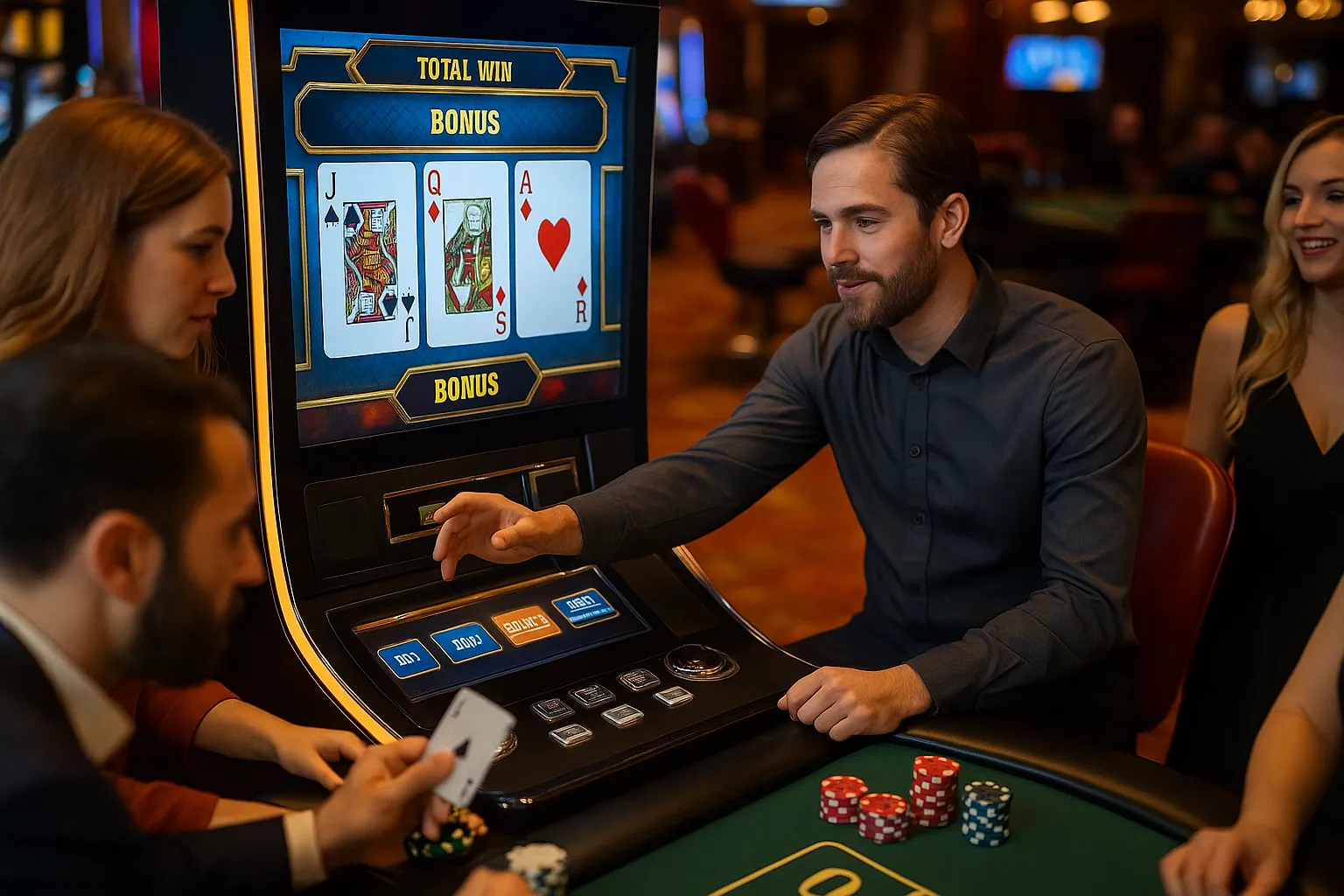The gaming industry has long relied on chance-based mechanics—spinning reels, rolling dice, and drawing cards—to determine player rewards. However, recent years have witnessed a notable shift: skill-based bonuses are now becoming a staple feature in many new games. These bonuses incorporate elements that test a player’s reflexes, decision-making, or strategic thinking, rather than purely random outcomes. As someone who’s spent countless hours exploring both traditional and modern casinos, I’ve seen first-hand how this evolution not only adds excitement but also empowers players to influence their potential winnings.
Skill-based bonuses can take many forms. In some slot machines, for example, a bonus round might present a mini-game where the player has to hit targets or solve a quick puzzle. In video poker titles, bonus multipliers might depend on the player’s choice of cards or speed of play. This approach bridges the gap between traditional casino mechanics and the interactive nature of video games, catering to a generation accustomed to influencing the action rather than passively awaiting results. We’ll explore how developers design these systems, the technology behind them, and real-world examples that illustrate their growing prominence.
In the pursuit of variety and appeal, many operators today—especially those at non GamStop casinos—are quick to adopt skill-based bonus features in their latest game offerings. By doing so, they cater to both seasoned gamblers and younger players looking for a more engaging experience. Whether you’re strolling down the aisles of a land-based casino or browsing an online lobby, you’ll likely encounter titles that reward hand–eye coordination or reward quick decision-making.
Why Skill-Based Bonuses Matter
Traditional bonus rounds rely on random number generators (RNGs) to trigger rewards. While RNGs ensure fairness and unpredictability, they can feel detached from a player’s personal skill. Skill-based systems allow players to have a direct impact on their bonus outcomes. This creates a sense of ownership: instead of hoping for a random hit, players feel motivated to master the mini-game and improve their performance over time.
Moreover, operators benefit from these mechanics as well. Skill-based bonuses can lengthen play sessions, foster loyalty, and differentiate their library of games. By offering something beyond what’s available at a typical slot terminal, casinos can target a broader audience—particularly younger demographics who expect interaction and agency in every digital experience. As a blogger who’s reviewed dozens of casino floors and sites, I’ve noticed how titles with skill-based features often become crowd favorites, drawing players away from standard fare.
Balancing Randomness and Skill
It’s important to recognize that even skill-based bonuses must maintain the core principle of randomness in gambling. Regulators require that overall payouts remain within predetermined percentages, so developers employ hybrid models. In such models, a random trigger still determines if you earn a bonus round, but once you’re in it, skill influences the magnitude of your reward. For instance, you might enter a bonus round with a guaranteed base prize, and your performance multiplies that base. This ensures fairness while still letting skill matter.
Game designers conduct extensive testing to strike the right balance. If a bonus is too easy, everyone wins big and the game becomes unprofitable. Conversely, if it’s overly challenging, players might feel discouraged. Through iterative design and player feedback, developers tweak timing windows, difficulty curves, and reward thresholds so that most players find the bonus both fun and attainable.
Common Types of Skill-Based Bonuses
Developers have introduced a variety of mechanisms. Below are a few common examples:
h3: Reflex-Based Challenges
In these mini-games, players must tap or click at precise moments. For instance, a spinning wheel stops rapidly, and hitting a button when the pointer aligns with a target yields extra coins. Another example is a shooter-style bonus where you aim at moving objects on screen to rack up points.
h3: Puzzle Solving
Some titles incorporate quick-match or tile-based puzzles. Completing the puzzle within a time limit results in larger multipliers. These puzzles often draw inspiration from popular mobile games, ensuring familiarity for players.
h3: Strategy or Trivia Rounds
A handful of games test your trivia knowledge or present a simple strategy scenario—like choosing paths in a maze. Each correct decision multiplies your bonus, but a single mistake might end the round early. This approach caters to players who enjoy cerebral challenges over reflexive tests.
h3: Combination Modes
Hybrid systems merge multiple elements. For example, a player may start with a memory-based task (matching symbols), and upon success, transition to a reflex round. These layered challenges keep the experience dynamic and engaging.
Technology and Fairness Considerations
Integrating skill-based bonuses demands robust hardware and software. In land-based casinos, modern cabinets feature high-resolution touchscreens and powerful processors capable of running interactive bonus content seamlessly. For online versions, HTML5 and advanced JavaScript frameworks allow developers to replicate arcade-like experiences directly in the browser, ensuring compatibility across desktop and mobile devices.
From a fairness standpoint, regulators require that skill-based outcomes do not give undue advantage to any player. That’s why the hybrid model—combining a random entry trigger with skill-influenced multipliers—has become industry standard. Independent testing agencies audit these systems to verify that RNG components function correctly and that bonus payouts align with published return-to-player (RTP) percentages.
Modern analytics tools also help operators monitor how different demographics engage with these features. If a particular skill challenge is proving too difficult, they can work with developers to adjust difficulty curves, ensuring neither the player nor the house is unfairly disadvantaged.
Real-World Examples
In my recent visits to various venues, I’ve encountered several notable titles:
-
“Arcade Spin Bonus”: This popular slot variation offers a “bonus wheel” round where you control a virtual cannon. Targets appear across a moving field, and hitting more targets yields higher multipliers. It’s reminiscent of classic skee-ball games, blending nostalgia with potential winnings.
-
“Puzzle Pyramid”: An adventure-themed slot that triggers a puzzle at the end of a winning spin. Players must rotate tiles to complete an ancient hieroglyph. Completing the puzzle within a set number of moves unlocks progressive bonus credits.
-
“Trivia Treasure Hunt”: Though rarer, this game tests your casino knowledge or general trivia. Answering consecutive questions correctly escalates your prize. Despite my shaky trivia skills, I found that even correct answers early in the round provided a fun thrill without overly penalizing mistakes.
Online, many non-GamStop casinos have quickly adopted these mechanics in their new releases. Rather than settling for generic slots, they’re promoting games where you feel in control. This trend has given rise to new developer studios specializing in skill-based content. Players seeking fresh experiences often cite these titles as reasons to explore non-traditional platforms.
Tips for Players
If you’re keen to try skill-based bonuses, here are a few pointers:
-
Practice Makes Perfect: Many games offer “free play” modes. Use these to familiarize yourself with timing windows or puzzle mechanics before wagering real money.
-
Watch Others First: In land-based venues, observe how seasoned players tackle the challenge. You might pick up strategies that save you from unnecessary losses.
-
Manage Expectations: Remember that you still need luck to reach the bonus round. Focus on improving at the mini-game itself, but don’t expect to win every time.
-
Choose Wisely: Some games let you select your bonus difficulty. If you’re new, pick the “normal” setting rather than “expert.” As you gain confidence, you can increase difficulty to chase higher multipliers.
The Future of Skill-Based Bonuses
As technology improves—especially with virtual reality (VR) and augmented reality (AR)—skill-based bonuses are poised to become even more immersive. Imagine stepping into a VR casino where you physically swing at targets or solve puzzles in a three-dimensional space. These developments will require regulators to update standards, but they also promise to revolutionize how we think about casino entertainment.
Moreover, successful implementation of skill-based mechanics could influence wider lottery and gaming markets. For example, certain state lotteries are already piloting scratch-off tickets where scanning a QR code unlocks an interactive game on your phone. Skill-based elements keep players engaged longer, which benefits both operators and consumers.
In summary, skill-based bonuses mark a significant shift in the gaming landscape. They respect players’ desire for meaningful interactivity, while still preserving the randomness that underpins casino integrity. As both a blogger and avid player, I find this trend refreshing—it brings a level of excitement and personal involvement that traditional RNG-only formats can’t match.




